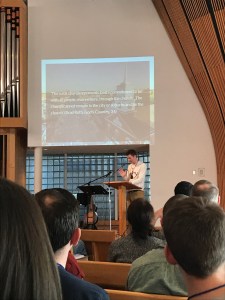I wrote this piece for Small Town Summits Articles. I am the Content Manager for STS Articles. I hope that it encourages both small-town pastors and lay Christians.

Is your Jesus big enough? In other words, is he the real Jesus? I know of nothing more powerful that will keep you trusting in Christ and serving him wherever he has called you than a fresh view of who Jesus is and what he has done. Erik Raymond insightfully writes, “The road to apostasy is paved with indifference to the glory of Christ.” We could add, the road to flaming out in pastoral ministry before our ministry is complete is paved with indifference to the glory of Christ.
The book of Hebrews teaches us that knowing and loving Jesus is what will keep us from apostasy (Hebrews 2:1-4, 3:12-19, 4:14, 5:11-6:8, 10:19-23, 12:25-29). It also teaches us that knowing and loving Jesus will give us the endurance to continue on in ministry (Hebrews 3:1-3, 4:16, 6:9-12, 10:22-25, 10:32-39, 11:1ff, 12:1-3, 12:12-16, 13:1ff).
Mixed with the blessings of being a pastor, we all have moments when we wonder if pastoral ministry is worth it. Sometimes those moments can be magnified by the unique challenges of ministry in a small place. One family moves away, and their absence is felt for the next year plus. You wonder if pouring out your life for the indifferent people in this town is the best use of your one life. A Sunday morning of low attendance makes you wonder about the future of your church. In almost a decade of pastoring in a small town in Vermont, I have felt all of those things and much more. But what has kept me at my post when I have felt like moving on is a realization of who Jesus is and that as long as he has a ministry for me in this small place, he is worth it. The greatness of Jesus propels me forward, and I know that he can do the same for you.
Hebrews 1:1-3 gives a mind-blowing view of the extraordinary Christ. This understanding of who Jesus is keeps us from thinking of Jesus as small in our small-town ministries. Five simple truths in these three verses can keep us faithful, and keep us fruitful.
1) Jesus Owns Everything!
Our extraordinary Christ doesn’t need anything. Hebrews 1:1-2a explains, “Long ago, at many times and in many ways, God spoke to our fathers by the prophets, but in these last days he has spoken to us by his Son, whom he appointed the heir of all things…” Knowing that the Savior whom we serve is the “heir of all things” reminds me that Jesus is Lord over my small town. Most may not recognize it yet, but he is still Lord. This truth also reminds me that he can provide for our small church in extraordinary ways when he chooses to. We have story after story of God providing buildings and finances and using our church to advance the gospel in our community, New England and around the world when it seemed impossible. We have seen the Lord of the harvest turn souls to himself in answer to prayer, when year after year of sowing gospel seeds didn’t appear to be bearing any fruit. When we recognize that Jesus owns it all, we can serve him and rest with joy.
2) Jesus Created Everything!
Hebrews 1:2b, still talking about Jesus, shocks us: “…through whom also he created the world.” It is easy to forget this truth because Jesus can seem so relatable at times. He walked among us. He was born in a small town. He died for me. Yet he is so cosmic. John 1:3 explains more: “All things were made through him, and without him was not anything made that was made.” Colossians 1:16-17 takes our understanding a step further: “For by him all things were created, in heaven and on earth, visible and invisible, whether thrones or dominions or rulers or authorities—all things were created through him and for him. And he is before all things, and in him all things hold together.”
Scientists tell us that there are probably about 100 billion galaxies and that each galaxy itself contains about one hundred thousand million stars (is that even a number?!). Jesus created it all! And the creator of it all who holds it all together cares about your small-town church. In fact, when you think about the greatness of space and the fact that he created it, everything is a small place compared to him.
3) Jesus Displays God in Everything!
Hebrews 1:3a continues to exult in Jesus, “He is the radiance of the glory of God and the exact imprint of his nature…” I want you to notice what the writer of Hebrews did not say. He did not say that Jesus is the reflection of God, like the moon reflects the brightness or glory of the sun. He says in Hebrews 1:3 that Jesus is the radiance of the glory of God, which means that he radiates the glory of God himself. In other words, we don’t look to Jesus to see a reflection of God, we look to Jesus to see God!
The fullest revelation of God’s glory that we have is Jesus. And we know that Jesus cared about the cities and the small places. He ministered in Jerusalem and Galilee. We reflect God’s glory when we reflect Jesus’s heart for the small places.
4) Jesus Upholds Everything!
If Jesus could go out of existence, the universe would immediately disintegrate and actually disappear. “…and he upholds the universe by the word of his power…” (Hebrews 1:3b) The reason that molecules act as they act is not because of the laws of science, it is because of the Lord Jesus! This is why he could multiply bread or speak to the water and wind. If Jesus can uphold everything, then he can uphold you no matter what challenges you are facing in life or ministry!
5) Jesus Forgave You For Everything!
We can be in awe of somebody great, but it doesn’t mean that we know them or love them. Yet the same one who is so great is the same one who died for you! Hebrews 1:3c reminds us, “…After making purification for sins, he sat down at the right hand of the Majesty on high…” Constantly reminding ourselves of the gospel takes us from knowing Jesus to loving Jesus. And truly loving Jesus means we will not only continue in the faith, but continue serving him.
Jesus is the wow factor in our small-town churches. If we continue to press into our extraordinary Christ, we will find that we can also press on for him.









